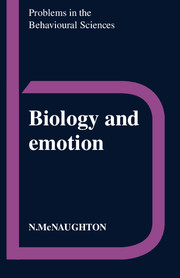Book contents
- Frontmatter
- Contents
- Preface
- Acknowledgements
- 1 Emotion since Darwin
- 2 Releasers and state-dependent reflexes
- 3 Purpose and emotion
- 4 Expression: a window on the emotions?
- 5 Are physiological changes epiphenomena of emotion?
- 6 Somatic influences on the emotions
- 7 Optimal foraging and the partial reinforcement effect: a model for the teleonomy of feelings?
- 8 Do emotions mature or differentiate?
- 9 Cognition, learning and emotion
- 10 Interaction of the components of emotion
- 11 Of mice and men
- 12 Biology and emotion: some conclusions
- Glossary
- Notes
- References
- Index
7 - Optimal foraging and the partial reinforcement effect: a model for the teleonomy of feelings?
Published online by Cambridge University Press: 05 August 2012
- Frontmatter
- Contents
- Preface
- Acknowledgements
- 1 Emotion since Darwin
- 2 Releasers and state-dependent reflexes
- 3 Purpose and emotion
- 4 Expression: a window on the emotions?
- 5 Are physiological changes epiphenomena of emotion?
- 6 Somatic influences on the emotions
- 7 Optimal foraging and the partial reinforcement effect: a model for the teleonomy of feelings?
- 8 Do emotions mature or differentiate?
- 9 Cognition, learning and emotion
- 10 Interaction of the components of emotion
- 11 Of mice and men
- 12 Biology and emotion: some conclusions
- Glossary
- Notes
- References
- Index
Summary
‘Is there any other point to which you would wish to draw my attention?’
‘To the curious incident of the dog in the night-time.’
‘The dog did nothing in the night-time.’
‘That was the curious incident,’ remarked Sherlock Holmes
Arthur Conan-Doyle: Silver BlazeTeleonomy, physiological change and feelings
Chapter 5 discussed a variety of physiological changes which can accompany emotions and which, we argued, adjust the organism's bodily systems in preparation for classes of action frequently required when that emotion is present. Chapter 6 concluded that such changes are not merely of physiological utility but can also play a controlling role in the psychology of emotion. As was noted, the presence of some compound such as adrenaline, or the changes in particular organ systems induced by such compounds, could come, through further evolution, to act as controllers of psychological states. Why, teleonomically speaking, they should do so is, however, not at all clear – and is quite likely to involve rather different reasons for different internal changes and different emotions.
In the present chapter I will discuss a particular behavioural phenomenon, the partial reinforcement extinction effect, and its underlying control. I will present a provisional account of the teleonomy of this phenomenon which will, I hope, show that reasonable teleonomic accounts of the psychological role of physiological changes can be constructed.
- Type
- Chapter
- Information
- Biology and Emotion , pp. 77 - 92Publisher: Cambridge University PressPrint publication year: 1989



